外研版高中英语选修8 Module 2 The Renaissance Reading Practice 课件(共45张PPT)
文档属性
| 名称 | 外研版高中英语选修8 Module 2 The Renaissance Reading Practice 课件(共45张PPT) | 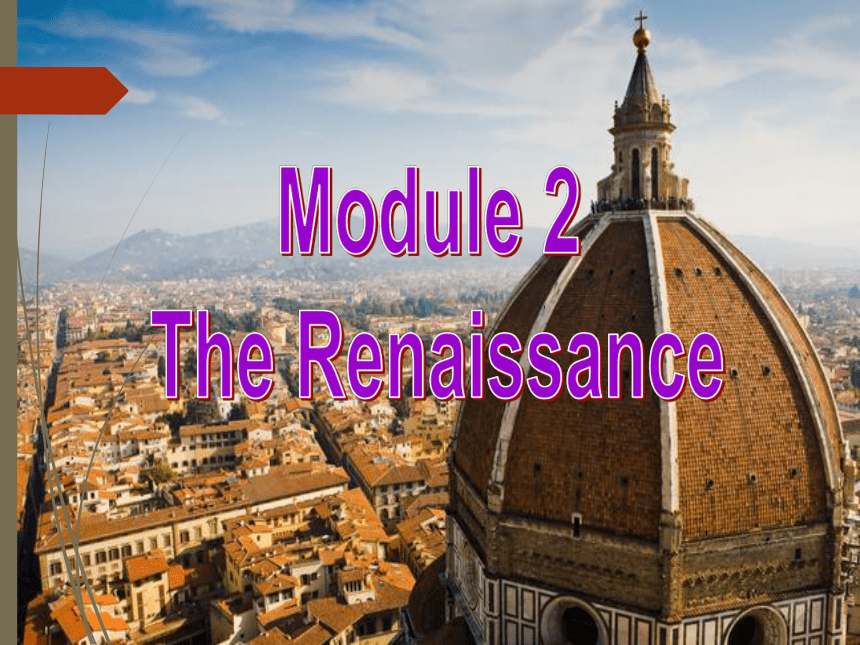 | |
| 格式 | zip | ||
| 文件大小 | 1.5MB | ||
| 资源类型 | 教案 | ||
| 版本资源 | 外研版 | ||
| 科目 | 英语 | ||
| 更新时间 | 2019-05-07 21:52:49 | ||
图片预览

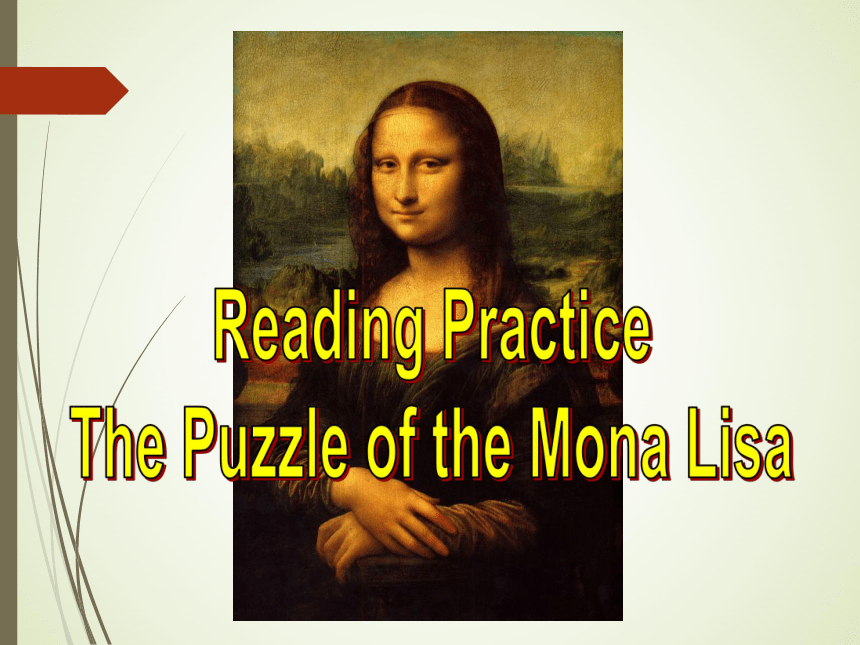

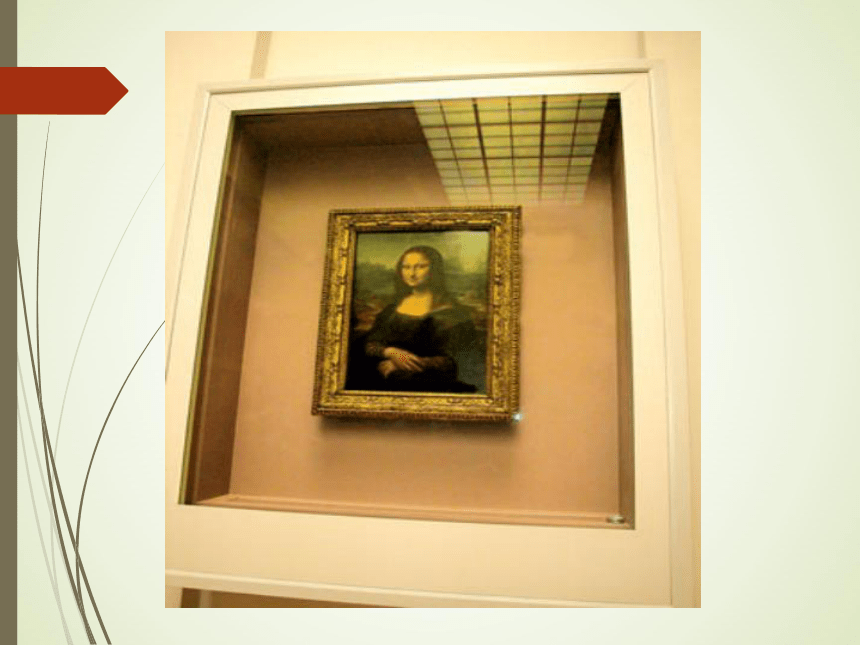
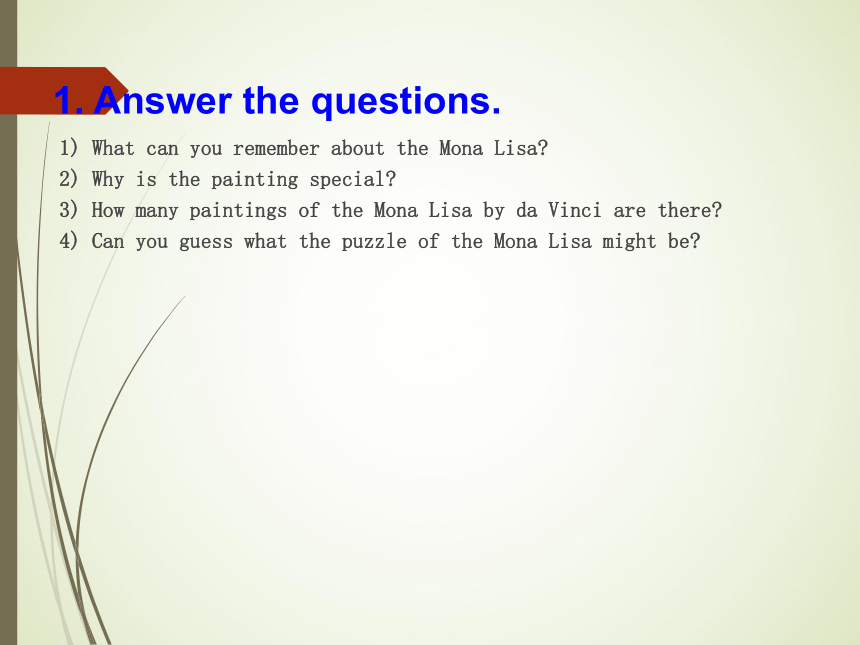
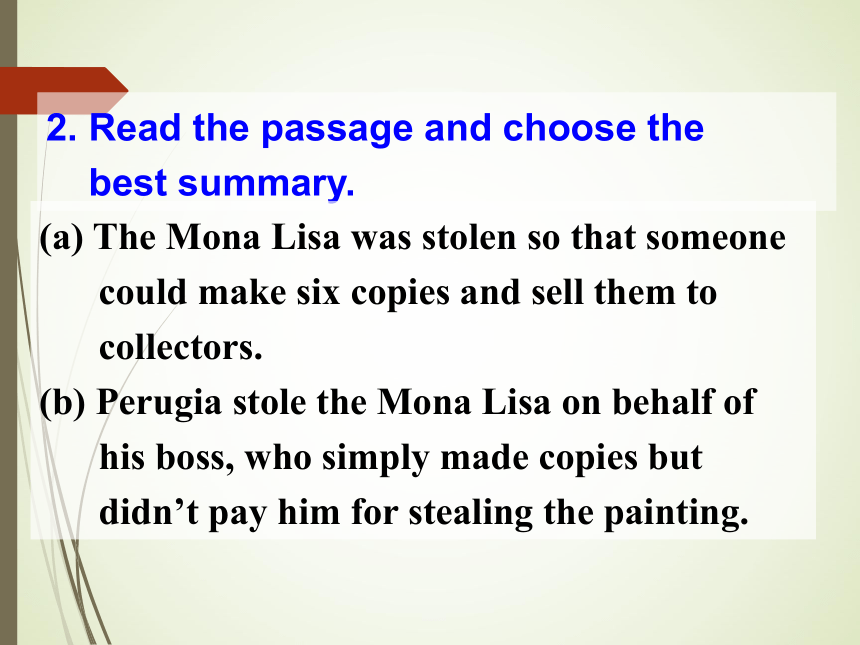
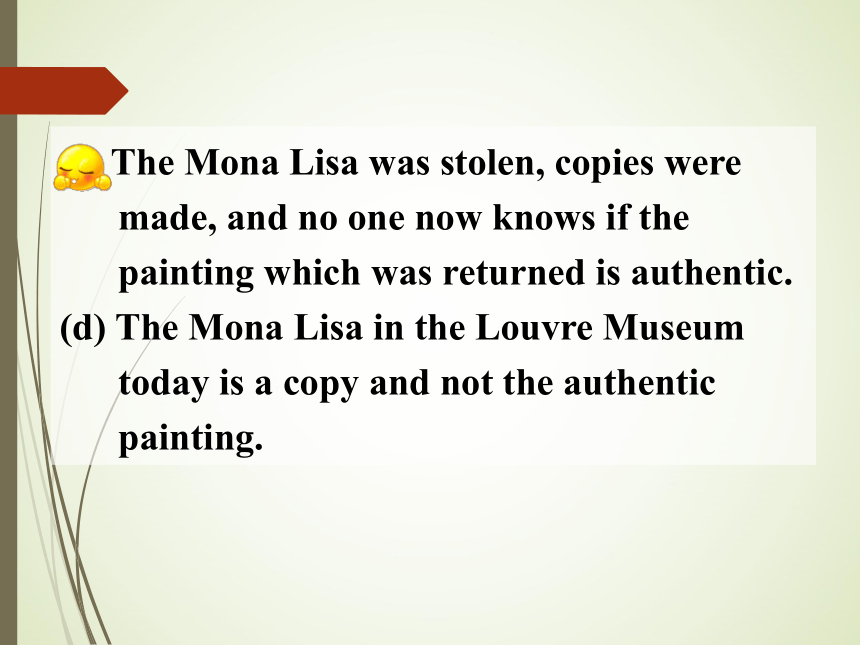
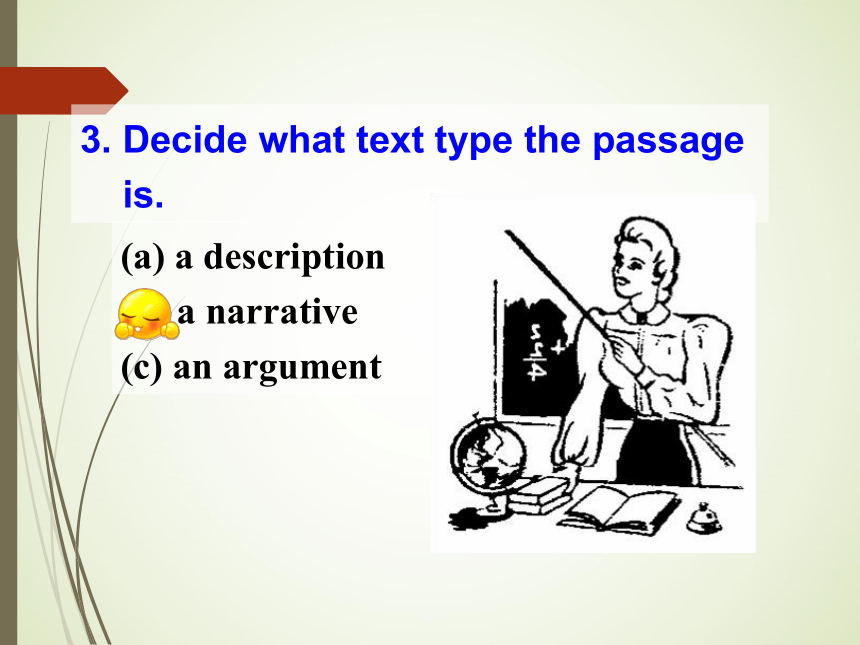
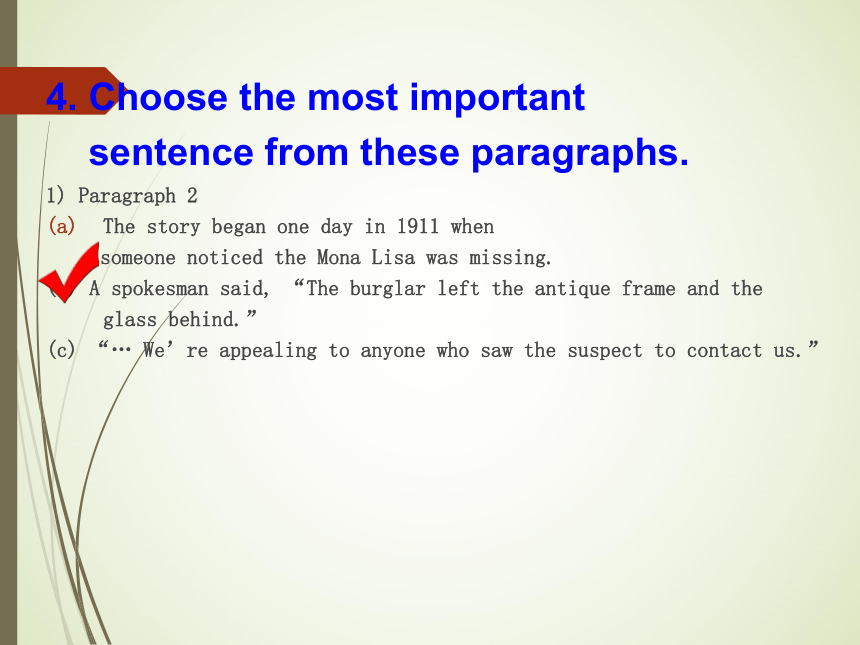

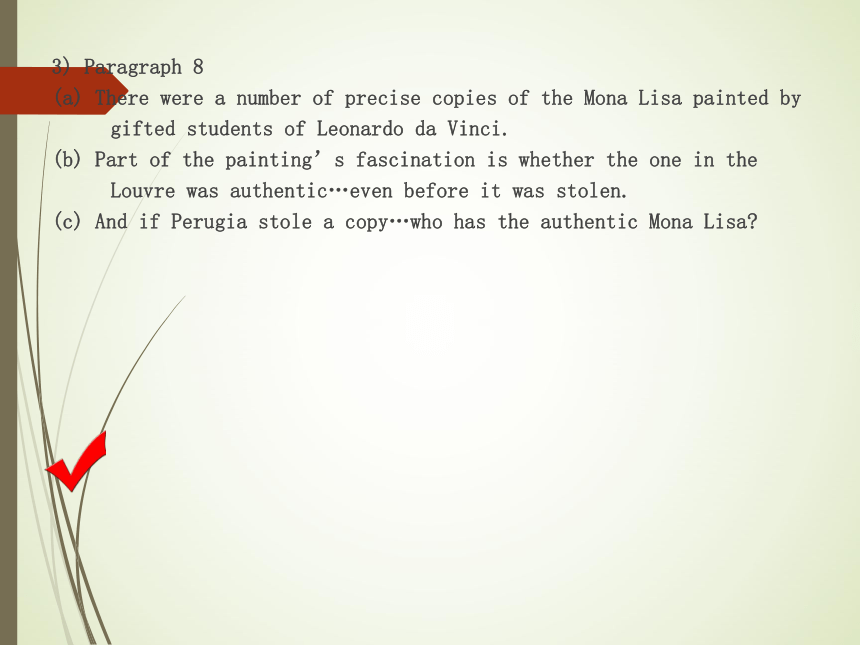
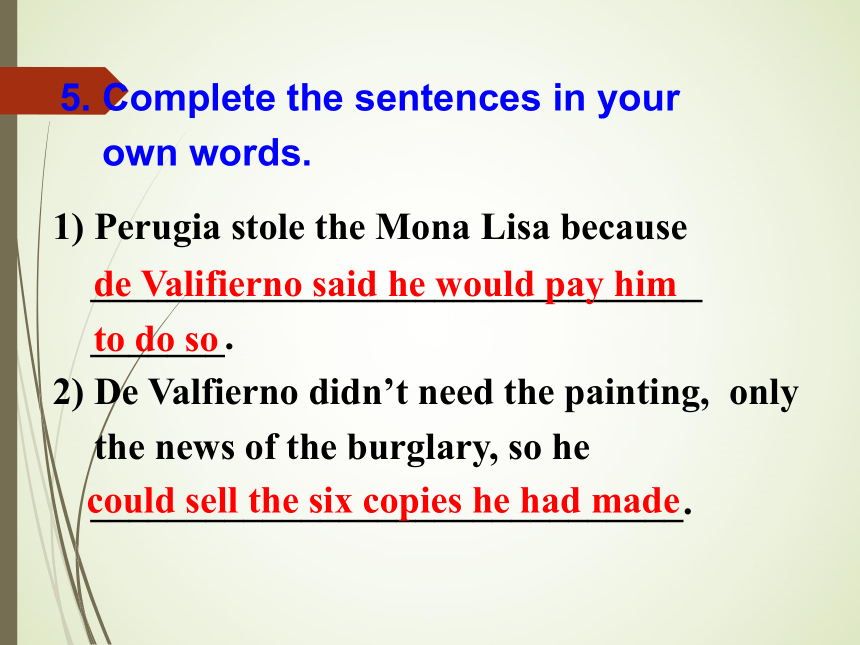
文档简介
课件45张PPT。Module 2
The RenaissanceReading Practice
The Puzzle of the Mona LisaTo try to understand a passage
To learn some key words1) What can you remember about the Mona Lisa?
2) Why is the painting special?
3) How many paintings of the Mona Lisa by da Vinci are there?
4) Can you guess what the puzzle of the Mona Lisa might be?1. Answer the questions.2. Read the passage and choose the
best summary.(a) The Mona Lisa was stolen so that someone could make six copies and sell them to collectors.
(b) Perugia stole the Mona Lisa on behalf of his boss, who simply made copies but didn’t pay him for stealing the painting.(c) The Mona Lisa was stolen, copies were made, and no one now knows if the painting which was returned is authentic.
(d) The Mona Lisa in the Louvre Museum today is a copy and not the authentic painting.3. Decide what text type the passage
is. a description
a narrative
an argument1) Paragraph 2
The story began one day in 1911 when
someone noticed the Mona Lisa was missing.
(b) A spokesman said, “The burglar left the antique frame and the glass behind.”
(c) “… We’re appealing to anyone who saw the suspect to contact us.”4. Choose the most important
sentence from these paragraphs.2) Paragraph 5
Why did the burglar, Vincenzo Perugia, wait so long?
The drawback for Perugia was that de Valifierno didn’t in fact need the painting, only the news of the theft.
De Valifierno made six superb copies and sold them, claiming that each one was the authentic stolen painting.3) Paragraph 8
(a) There were a number of precise copies of the Mona Lisa painted by gifted students of Leonardo da Vinci.
(b) Part of the painting’s fascination is whether the one in the Louvre was authentic…even before it was stolen.
(c) And if Perugia stole a copy…who has the authentic Mona Lisa?5. Complete the sentences in your
own words.1) Perugia stole the Mona Lisa because
________________________________
_______.
2) De Valfierno didn’t need the painting, only the news of the burglary, so he
_______________________________. de Valifierno said he would pay him
to do socould sell the six copies he had made3) Perugia waited two years before trying to sell the Mona Lisa, because
__________________________________
4) When the buyers heard that Perugia had tried to sell the painting, de Valifierno _________________________________he thought de Valifierno would pay himtold them that it was a copy.5) The Mona Lisa in the Louvre may only have been a copy when it was stolen, so ________________________________
_______________.no one knows where the real Mona Lisa isFill in the blanks. Tang? printing press? ?Bible?1476? the Greek and Latin classics?artistic expressionFill in the blanks.
One day in 1. _______, the?Mona Lisa?in the Louvre was missing. Then there was a widespread search for the burglar all over the country. Two years later, a man with a moustache made a(n) 2. ________________ to sell the?Mona Lisa?to an art dealer. After checking it, the art dealer agreed it was 3. _________ and called the police. 1911tentative attempt?authentic?The truth was that the burglar had stolen it on behalf of the chief organizer of the crime. But the chief organizer refused to pay the burglar for the painting because what he needed was 4. __________________ rather than the painting. He made six superb copies and sold them, claiming each one was the 5. ______________. the news of the theft?stolen paintingAt last the burglar was 6. ______________.
However, there is still a puzzle. Is the?Mona Lisa?in the Louvre the original work by Leonardo da Vinci or just a copy?put into prison1) dash means
a. go b. drive c. run d. walk
2) drawback means
a. disadvantage b. mistake
c. disappointment d. advice
3) confidential means
a. secret b. unnecessary
c. amusing d. illegalChoose the correct answers.4) De Valifierno wanted everyone to hear about the news of the burglary ____.
a. to tell the buyers the real Mona Lisa
was just a copy
b. to make six copies
c. to avoid paying Perugia
d. to convince each buyer they had the
authentic painting and not a copy 5) The six buyers didn’t know about the other paintings because __.
a. they hadn’t heard the news
b. they might have guessed that their
painting was a copy
c. De Valifierno had told them their
copy was the authentic painting
d. Perugia had waited so long before
trying to sell the painting 1. A passerby saw a man with a moustache,
carrying a parcel under his arm, dash
over the street crossing, along to the
crossroads.
一个路人看见一个有胡子的男人胳膊下
夹着一个包裹冲向十字路口,沿十字路
口向前。along adv.
1) 向前
e.g. He sang loudly as he walked along.
(翻译)
他边向前走边大声唱着歌。
2) 一起;带着(+with)
e.g. Come along with us.
跟我们一道去吧。 3) 来到;去到
e.g. I’ll be along in a minute. (翻译)
我一会儿就来。2. The burglar left the antique frame and
the glass behind.
窃贼留下古董架和玻璃。
leave… behind
1) 忘了带;留下
e.g. I’ve left my pen behind. (翻译)
我忘了带我的笔。2) 抛在后面
e.g. They soon left the city light behind.
(翻译)
他们不久就把这座城市的灯光抛在后面
了。
3) 留下,遗留
e.g. He left a great fame behind him.
(翻译)
他留了一个伟大的名声。 3. We’re appealing to anyone who saw the suspect to contact us.
我们正在呼吁人们看到嫌犯联系我们。
appeal v. 1) 呼吁;恳求
e.g. He appealed to me for help.
He appealed to his friends for
support. (翻译)
他向我求援。
他请求朋友支持。 2) 诉诸;求助
e.g. We will appeal to a great variety
of sources of information. (翻译)
我们将求助于多种资料来源。
3) 有吸引力;迎合爱好
e.g. The idea appealed to Mary. (翻译)
这主意正合玛丽的心意。4. News about the loss of the Mona Lisa was circulated in all the French newspapers,…
蒙娜丽莎丢失的消息在法国报纸上流传。circulate v.
1) 使循环;环流;
e.g. Blood circulates round the body.
Open the window to allow the air
to circulate. (翻译)
血液在体内循环。
开窗使空气流通。2) 散布;流传;扩散
e.g. Rumors circulated rapidly.
People who circulate false news are to blame. (翻译)
谣言迅速散布开来。
传播假消息的人应受谴责。3) 随意地到处走动
e.g. The host and hostess circulated among their guests. (翻译)
男女主人在客人间走动以招待他们。5. We’re seeking a gang of criminals.
我们正在寻找一个犯罪团伙。
seek v.
1) 搜寻, 寻找, 寻觅(常与for, after连用)
e.g. We sought an answer to the question,
but couldn’t find one. (翻译)
我们寻求这个问题的答案, 可是没
能找到。These young graduates are seeking after success in life.
这些年青毕业生在探索人生成功之途。2) 请求,要求
e.g. I will seek my doctor’s advice.
You must seek permission from the
manager. (翻译)
我将征求医生的意见。
你需要请求经理批准。3) 尝试;试图;企图
e.g. He sought to make peace.
I have never sought to hide my
views. (翻译)
他试图讲和。
我从不尝试隐瞒自已的观点。6. The outcome of the story is that Perugia got the blame for the crime and went to prison.
故事的结局是佩鲁贾被定为犯罪,去了监狱。
blame
1) v. 埋怨,归咎e.g. They blamed the failure on George.
They blamed the secretary for the delay of the plan.
他们把失败归咎于乔治。
他们怪罪秘书造成计划延误。2) n. 谴责;归咎
e.g. He put the blame of his failure in
the exam on his teacher. (翻译)
他把考试不及格归罪于他的老师。 常用习语:
put/lay the blame (n.) on sb. (for sth.)
把某事归咎于某人
take/bear the blame (n.) 承担责任
be to blame (v.) 应受谴责
e.g. The children were not to blame.
(翻译)
孩子们不应受到谴责。The company is ready to take the blame for what had happened.
The police laid the blame for the accident on the driver. (翻译)
公司准备对已发生的事情承担责任。
警方把责任归于司机。Imagine that someone has stolen a famous work of art in China. Write a newspaper
article describing
what happened.
The RenaissanceReading Practice
The Puzzle of the Mona LisaTo try to understand a passage
To learn some key words1) What can you remember about the Mona Lisa?
2) Why is the painting special?
3) How many paintings of the Mona Lisa by da Vinci are there?
4) Can you guess what the puzzle of the Mona Lisa might be?1. Answer the questions.2. Read the passage and choose the
best summary.(a) The Mona Lisa was stolen so that someone could make six copies and sell them to collectors.
(b) Perugia stole the Mona Lisa on behalf of his boss, who simply made copies but didn’t pay him for stealing the painting.(c) The Mona Lisa was stolen, copies were made, and no one now knows if the painting which was returned is authentic.
(d) The Mona Lisa in the Louvre Museum today is a copy and not the authentic painting.3. Decide what text type the passage
is. a description
a narrative
an argument1) Paragraph 2
The story began one day in 1911 when
someone noticed the Mona Lisa was missing.
(b) A spokesman said, “The burglar left the antique frame and the glass behind.”
(c) “… We’re appealing to anyone who saw the suspect to contact us.”4. Choose the most important
sentence from these paragraphs.2) Paragraph 5
Why did the burglar, Vincenzo Perugia, wait so long?
The drawback for Perugia was that de Valifierno didn’t in fact need the painting, only the news of the theft.
De Valifierno made six superb copies and sold them, claiming that each one was the authentic stolen painting.3) Paragraph 8
(a) There were a number of precise copies of the Mona Lisa painted by gifted students of Leonardo da Vinci.
(b) Part of the painting’s fascination is whether the one in the Louvre was authentic…even before it was stolen.
(c) And if Perugia stole a copy…who has the authentic Mona Lisa?5. Complete the sentences in your
own words.1) Perugia stole the Mona Lisa because
________________________________
_______.
2) De Valfierno didn’t need the painting, only the news of the burglary, so he
_______________________________. de Valifierno said he would pay him
to do socould sell the six copies he had made3) Perugia waited two years before trying to sell the Mona Lisa, because
__________________________________
4) When the buyers heard that Perugia had tried to sell the painting, de Valifierno _________________________________he thought de Valifierno would pay himtold them that it was a copy.5) The Mona Lisa in the Louvre may only have been a copy when it was stolen, so ________________________________
_______________.no one knows where the real Mona Lisa isFill in the blanks. Tang? printing press? ?Bible?1476? the Greek and Latin classics?artistic expressionFill in the blanks.
One day in 1. _______, the?Mona Lisa?in the Louvre was missing. Then there was a widespread search for the burglar all over the country. Two years later, a man with a moustache made a(n) 2. ________________ to sell the?Mona Lisa?to an art dealer. After checking it, the art dealer agreed it was 3. _________ and called the police. 1911tentative attempt?authentic?The truth was that the burglar had stolen it on behalf of the chief organizer of the crime. But the chief organizer refused to pay the burglar for the painting because what he needed was 4. __________________ rather than the painting. He made six superb copies and sold them, claiming each one was the 5. ______________. the news of the theft?stolen paintingAt last the burglar was 6. ______________.
However, there is still a puzzle. Is the?Mona Lisa?in the Louvre the original work by Leonardo da Vinci or just a copy?put into prison1) dash means
a. go b. drive c. run d. walk
2) drawback means
a. disadvantage b. mistake
c. disappointment d. advice
3) confidential means
a. secret b. unnecessary
c. amusing d. illegalChoose the correct answers.4) De Valifierno wanted everyone to hear about the news of the burglary ____.
a. to tell the buyers the real Mona Lisa
was just a copy
b. to make six copies
c. to avoid paying Perugia
d. to convince each buyer they had the
authentic painting and not a copy 5) The six buyers didn’t know about the other paintings because __.
a. they hadn’t heard the news
b. they might have guessed that their
painting was a copy
c. De Valifierno had told them their
copy was the authentic painting
d. Perugia had waited so long before
trying to sell the painting 1. A passerby saw a man with a moustache,
carrying a parcel under his arm, dash
over the street crossing, along to the
crossroads.
一个路人看见一个有胡子的男人胳膊下
夹着一个包裹冲向十字路口,沿十字路
口向前。along adv.
1) 向前
e.g. He sang loudly as he walked along.
(翻译)
他边向前走边大声唱着歌。
2) 一起;带着(+with)
e.g. Come along with us.
跟我们一道去吧。 3) 来到;去到
e.g. I’ll be along in a minute. (翻译)
我一会儿就来。2. The burglar left the antique frame and
the glass behind.
窃贼留下古董架和玻璃。
leave… behind
1) 忘了带;留下
e.g. I’ve left my pen behind. (翻译)
我忘了带我的笔。2) 抛在后面
e.g. They soon left the city light behind.
(翻译)
他们不久就把这座城市的灯光抛在后面
了。
3) 留下,遗留
e.g. He left a great fame behind him.
(翻译)
他留了一个伟大的名声。 3. We’re appealing to anyone who saw the suspect to contact us.
我们正在呼吁人们看到嫌犯联系我们。
appeal v. 1) 呼吁;恳求
e.g. He appealed to me for help.
He appealed to his friends for
support. (翻译)
他向我求援。
他请求朋友支持。 2) 诉诸;求助
e.g. We will appeal to a great variety
of sources of information. (翻译)
我们将求助于多种资料来源。
3) 有吸引力;迎合爱好
e.g. The idea appealed to Mary. (翻译)
这主意正合玛丽的心意。4. News about the loss of the Mona Lisa was circulated in all the French newspapers,…
蒙娜丽莎丢失的消息在法国报纸上流传。circulate v.
1) 使循环;环流;
e.g. Blood circulates round the body.
Open the window to allow the air
to circulate. (翻译)
血液在体内循环。
开窗使空气流通。2) 散布;流传;扩散
e.g. Rumors circulated rapidly.
People who circulate false news are to blame. (翻译)
谣言迅速散布开来。
传播假消息的人应受谴责。3) 随意地到处走动
e.g. The host and hostess circulated among their guests. (翻译)
男女主人在客人间走动以招待他们。5. We’re seeking a gang of criminals.
我们正在寻找一个犯罪团伙。
seek v.
1) 搜寻, 寻找, 寻觅(常与for, after连用)
e.g. We sought an answer to the question,
but couldn’t find one. (翻译)
我们寻求这个问题的答案, 可是没
能找到。These young graduates are seeking after success in life.
这些年青毕业生在探索人生成功之途。2) 请求,要求
e.g. I will seek my doctor’s advice.
You must seek permission from the
manager. (翻译)
我将征求医生的意见。
你需要请求经理批准。3) 尝试;试图;企图
e.g. He sought to make peace.
I have never sought to hide my
views. (翻译)
他试图讲和。
我从不尝试隐瞒自已的观点。6. The outcome of the story is that Perugia got the blame for the crime and went to prison.
故事的结局是佩鲁贾被定为犯罪,去了监狱。
blame
1) v. 埋怨,归咎e.g. They blamed the failure on George.
They blamed the secretary for the delay of the plan.
他们把失败归咎于乔治。
他们怪罪秘书造成计划延误。2) n. 谴责;归咎
e.g. He put the blame of his failure in
the exam on his teacher. (翻译)
他把考试不及格归罪于他的老师。 常用习语:
put/lay the blame (n.) on sb. (for sth.)
把某事归咎于某人
take/bear the blame (n.) 承担责任
be to blame (v.) 应受谴责
e.g. The children were not to blame.
(翻译)
孩子们不应受到谴责。The company is ready to take the blame for what had happened.
The police laid the blame for the accident on the driver. (翻译)
公司准备对已发生的事情承担责任。
警方把责任归于司机。Imagine that someone has stolen a famous work of art in China. Write a newspaper
article describing
what happened.
